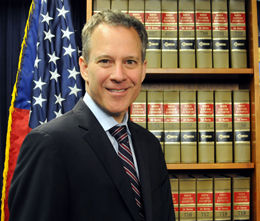State Attorney General Eric Schneiderman on Monday proposed a series of ethics reforms that he said are meant to “cure the disease” of public corruption in Albany.
Speaking at a forum in Manhattan hosted by the non-partisan government watchdog group Citizens Union, Schneiderman, a Democrat, called for an end to state legislators holding jobs outside their responsibilities as lawmakers as well as an overhaul of New York’s campaign finance system and limiting a system of “pay-to-play” contributions from lobbying entities.
“To cure the disease, we must break a pattern in which scandal is followed by outrage, which is followed by reforms that largely tinker at the margins, and a press conference declaring that the problem has been solved, which is ultimately followed by another scandal,” Schneiderman said. “It looks to the people of New York like one charade after another.”
“The people of this great state demand comprehensive, fundamental reforms,” he continued. “They deserve nothing less.”
Schneiderman’s proposals come a few weeks after former state Assembly Speaker Sheldon Silver pleaded not guilty to corruption-related charges stemming from an alleged kickback scheme between doctors who had business with the state and a law firm that employed Silver.
Schneiderman said his ethics reforms are more extensive than any previously put forth by a state official, and involve proposals that directly effect the livelihood of state lawmakers and the election fundraising process.
He added he supported Gov. Andrew Cuomo’s ethics package as part of the 2015-16 state budget – which include expanded campaign finance disclosure requirements, the forfeiture of a pension for convicted state lawmakers and ending “per diem” reimbursements – but said proposals should be even more strict.
“I would urge the governor to hold out for even bolder reforms, including the proposals I have outlined,” Schneiderman said. “In doing so, he would have the support of both the constitution and the people of the state of New York. A late budget would be a small price to bay.”
In an effort to end what he considers a seemingly endless cycle of election fundraising, Schneiderman proposed a state constitutional amendment to increase legislator terms from two years to four years and suggested expanding the role of legislative committees. He also proposed a salary increase for state legislators that would pit their compensation between that of New York City council members and federal lawmakers.
Doing so, he said, would place more significance on the role state lawmakers play in New York’s legislative process and make the job more attractive to talented candidates who may not have considered running for state office.
“How else do we attract good people into government?” he said. “Not by weakening reform, but by strengthening it. The same things that will make the legislature a more attractive career path are what will make it a more ‘small d’ democratic institution.”
Schneiderman also proposed a series of campaign finance reforms focused around the strengthening and modifying various election laws.
He suggested a reduction of campaign contribution limits and closing legal loopholes that enable limited liability corporations to “funnel limitless amounts to campaigns,” Schneiderman said.
Schneiderman also proposed the practice of public matching funds to the state level, the elimination of legislative “housekeeping committees” that he said serve as “barely regulated slush funds” for parties and campaigns and limiting entities with business relationships with the state to make “extremely modest campaign contributions.”



